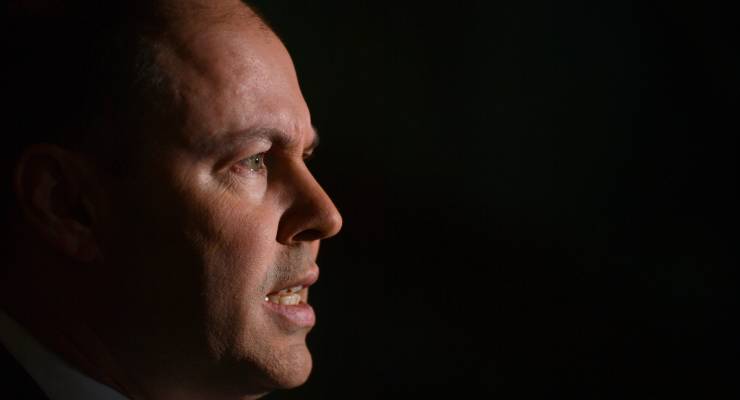
Treasurer Josh Frydenberg says a lot of things that are not entirely true. Some are spin, some are outright untruths. Unfortunately this is getting worse, not better, as the mainstream media rewards him consistently.
His statements in an opinion piece in The Australian Financial Review following the Mid-Year Economic and Fiscal Outlook contained several sentences which simply don’t add up.
The federal budget update confirms Australia’s economy is rebounding strongly.
No, it doesn’t. The June quarter collapse of gross domestic product (GDP) was 7%. The claw-back in September was less than half that, at a puny 3.3%. That is among the world’s worst.
Many countries experienced negative June quarters due to the pandemic. Most are recovering well. Of the 36 developed OECD members which have posted September growth numbers, 12 recorded a higher recovery in September than the decline in June. In other words, their entire June quarter GDP losses were recouped.
Switzerland, for example, copped the same June figure of 7% negative growth as Australia, but bounced back in September with positive 7.2%. Ireland went backwards 3.2% in June but recovered with a thumping positive 11.1% in September. We can say Ireland’s economy is rebounding strongly, but not Australia’s.
Of that OECD group, another 20 countries recovered in September more than half their June losses. Germany, for example, lost 9.8% of GDP in June. Not good. But its September bounce-back was a healthy 8.5%. Pretty good.
That leaves four loser countries at the tail — Chile, Iceland, Greece and Australia — with anaemic recoveries.
Frydenberg’s second claim was that “Australia is outperforming all of the major advanced economies”.
Absolutely the opposite of the truth. The 3.3% quarterly growth for September ranks 33rd out of the 36 OECD members.
The updated numbers are … better than what was expected at budget 10 weeks ago. Unemployment is lower …
In fact, unemployed people at the end of September, six days before the October budget, totalled 935,300. Yesterday’s ABS update put this at 942,100. That is a numerical increase, even if a minuscule percentage improvement.
Frydenberg bragged that “85% of the 1.3 million Australians who either lost their jobs, or saw their working hours reduced to zero, are now back at work”. Okay. But that still means 15% are not. This is poor compared with Australia’s past and with other economies today.
Australia’s 6.83% jobless rate ranks 19th among the OECD members for which we have current data, which is all 37.
Frydenberg then tried the old trick, which the media invariably let him get away with, of comparing outcomes with the magical mythical “expectations”:
With 734,000 jobs created over the last six months, the labour market has performed better than expected.
But imaginary expectations are the only yardsticks against which outcomes appear satisfactory. Compared with other countries today and with Australia during the last major global recession, the numbers are woeful.
Australia’s debt levels, even at their peak, remain less than half the average seen across advanced economies today.
Even if true, that is an appalling admission. At the end of the Howard era, Australia’s debt relative to GDP ranked sixth lowest in the OECD. Only Chile, Estonia, Luxembourg, Latvia and New Zealand were lower. At the end of the Rudd/Gillard period, Australia debt relative to GDP ranked third lowest. Only Chile and Estonia were lower. Now Australia is somewhere in the middle, and Frydenberg is proud of himself. Really?
Throughout the global financial crisis of 2008 to 2012, Australia was consistently among world leaders on all measures – bar none.
Australia’s annual GDP growth was in the OECD’s top eight for most of that period. It was top of the table in the first and second quarters of 2009. Australia’s jobless rate was in the top eight for virtually the entire Labor period, 2008 to 2013. It ranked third at the end of 2010, behind only Norway and South Korea.
There is no excuse for this disastrous deterioration in these outcomes. Australia has received a phenomenal boost from the recent global boom. Despite current wobbles in trade with China, Australia’s overall exports have surged at a greater rate than in any other OECD country since 2012.
That all being said, the budget update provides further cause for optimism that Australia’s economic comeback is under way.
Optimism is certainly warranted regarding controlling the pandemic. Wholehearted congratulations to his government for its role in achieving this.
But on the health of the economy, Australia is currently worse-placed than at any time since records have been kept.








A sick government exacerbated by a sicker media, unable/unwilling to break ranks and analyse what’s really going on and pas it on to we rubes
It makes you wonder why we should support the Govt’ s Google and Facebook tax when the news outlets in this country employ such inept journos.
Frydenberg is no manager of the economy. He is just an incompetent and dishonest observer, snuggled up with his neoliberal fantasies.
Thank you, Alan Austin.
That is the sort of financial reporting I want to see here rather than the usual flim-flam from Keane et al.
More please.
The flim-flam brigade does not include the forensic Stephen Mayne.
And yet the zombie belief persists, that the Liberals are better at managing the economy.